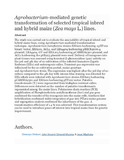Please use this identifier to cite or link to this item:
http://ir-library.mmust.ac.ke:8080/xmlui/handle/123456789/1558Full metadata record
| DC Field | Value | Language |
|---|---|---|
| dc.contributor.author | Ombori, Omwoyo | - |
| dc.contributor.author | Muoma, John Vincent Omondi | - |
| dc.contributor.author | Machuka, Jesse | - |
| dc.date.accessioned | 2021-06-03T11:23:01Z | - |
| dc.date.available | 2021-06-03T11:23:01Z | - |
| dc.date.issued | 2012-10-25 | - |
| dc.identifier.uri | https://doi.org/10.1007/S11240-012-0247-1 | - |
| dc.identifier.uri | https://link.springer.com/article/10.1007/s11240-012-0247-1 | - |
| dc.identifier.uri | http://r-library.mmust.ac.ke/123456789/1558 | - |
| dc.description.abstract | The study was carried out to evaluate the amenability of tropical inbred and hybrid maize lines, using Agrobacterium mediated transformation technique. Agrobacterium tumefaciens strains EHA101 harbouring a pTF102 binary vector, EHA101, AGL1, and LBA4404 harbouring pBECK2000.4 plasmid, LBA4404, GV and EHA105 harbouring pCAMBIA2301 plasmid, and AGL1 harbouring the pSB223 plasmid were used. Delivery of transgenes into plant tissues was assessed using transient β-glucuronidase (gus) activity on the 3rd and 4th day of co-cultivation of the infected Immature Zygotic Embryos (IZEs) and embryogenic callus. Transient gus expression was influenced by the co-cultivation period, maize genotype and Agrobacterium strain. The expression was highest after the 3rd day of co-culture compared to the 4th day with intense blue staining was detected for IZEs which were infected with Agrobacterium strains EHA105 harbouring pCAMBIA2301 and EHA101 harbouring pTF102 vector. Putative transformants (To) were regenerated from bialaphos resistant callus. Differences were detected on the number of putative transformants regenerated among the maize lines. Polymerase chain reaction (PCR) amplification of Phosphinothricin acetyltransferase (bar) and gus gene confirmed the transfer of the transgenes into the maize cells. Southern blot hybridization confirmed stable integration of gus into PTL02 maize genome and segregation analysis confirmed the inheritance of the gus. A transformation efficiency of 1.4 % was achieved. This transformation system can be used to introduce genes of interest into tropical maize lines for genetic improvement. | en_US |
| dc.language.iso | en | en_US |
| dc.publisher | Plant Cell, Tissue and Organ Culture (PCTOC) | en_US |
| dc.subject | Agrobacterium,mediated, genetic, transformation, tropical, inbred, hybrid, maize | en_US |
| dc.title | Agrobacterium-mediated genetic transformation of selected tropical inbred and hybrid maize (Zea mays L.) lines. | en_US |
| dc.type | Article | en_US |
| Appears in Collections: | Gold Collection | |
Files in This Item:
| File | Description | Size | Format | |
|---|---|---|---|---|
| Agrobacterium-mediated genetic transformation of selected tropical inbred and hybrid maize (Zea mays L.) lines..pdf | 356.29 kB | Adobe PDF |  View/Open |
Items in DSpace are protected by copyright, with all rights reserved, unless otherwise indicated.
